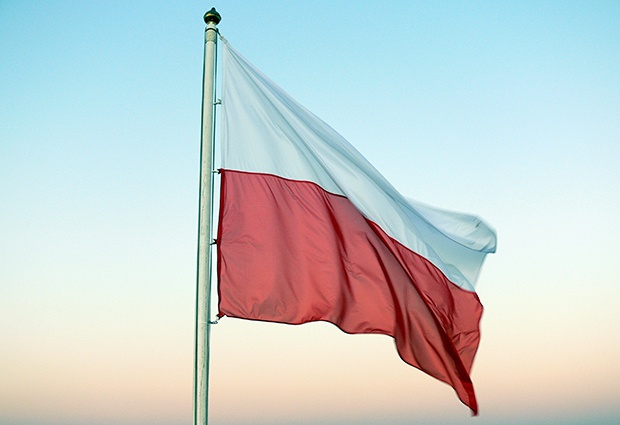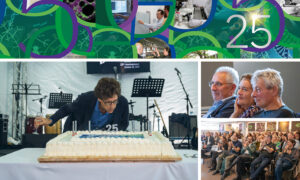
Polish connections
Poland is EMBL’s newest prospect member state, and connection, cooperation and collaboration are now high on the agenda for the Laboratory and the country's research institutions. One person who knows both EMBL and Poland well is Anna Bartosik, a PhD student in the Knop group at EMBL Heidelberg from 2008 to 2012, before moving on to a postdoc at the International Institute of Molecular and Cell Biology in Warsaw.

What is your current role?
I am working in a cell biology lab headed by Marta Miączyńska (also an EMBL alumna), at the interface between endocytosis and NF-kappaB signalling in mammalian cell lines. The beginning of my time here was very challenging because I had to learn a lot of new techniques, moving from a yeast lab to working in cell culture, but it was also immensely rewarding. Apart from scientific work, I contribute articles to the weekly magazine Tygodnik Powszechny and have published nine pieces on various life science topics, most recently on genome archeology. I was also involved in planning and organising educational workshops for school children aged 10–12, was co-author of the educational book Be Healthy as a Fish, and also contributed towards a film on the topic.

What part did EMBL play in your career?
My time at EMBL has had a huge impact on my scientific skills and networks. At EMBL I could do top science, hear lectures from some of the best scientists in the world, as well as mix and mingle with fellow students, postdocs and other professionals. It gave me a broad perspective of the hottest scientific topics as well as providing a fantastic grounding from a technical point of view. Yeast was a completely new topic for me when I joined, but with the fantastic support from my colleagues and some trial and error, I progressed quickly. It was also fascinating to learn about behind-the-scenes workings of a major intergovernmental research institution.
Working in the lab was also character forming. There were hard moments – which are normal during doctoral studies – but I managed to overcome those and defend my thesis. Experimental work, with its success and failures, taught me to be persistent, to work independently, to learn from my mistakes, to not be afraid to try different approaches, and to effectively plan and complete projects simultaneously. I met great people from all over the world, learning about different cultures and traditions – connections made easier through initiatives such as Lab Day, or parties such as Oktoberfest and Burns’ Night. It is easy to take the diverse, vibrant and intellectual culture for granted while there, but now I can look back and appreciate the opportunities that EMBL provides, especially to young and motivated students .
It is easy to take the diverse, vibrant and intellectual culture for granted while in the Lab, but now I can look back and appreciate the opportunities that EMBL provides.
Are you still in touch with anyone from your time at EMBL?
I stay in touch with members from the Knop group, as well as fellow PhD students and postdocs. Some of them are still in Heidelberg and some have moved to other parts of the world – I now have a wide network of contacts all over the planet. Dean of Graduate Studies Helke Hillebrand was a great support during the hard moments of my PhD and continues to be so in my work since. In October, I arranged for Darren Gilmour, a group leader at EMBL Heidelberg, to give a talk at our institute – I hope that prospect membership will enrich such connections between EMBL and Polish research institutions. I have visited EMBL twice this year, including for the 40th Anniversary Reunion event. It was great to see old faces, but also to appreciate how much the Lab has changed since I left. I very much enjoyed the international atmosphere, scientific talks, and learning more about EMBL’s fascinating history. There was a Knop group reunion during the event, and it was great to catch up with people.
What are your fondest memories from your time at EMBL?
The old cafeteria had a very special atmosphere: one could retreat from the lab in times of emergency, or while waiting for an experiment to finish, and have a much-needed slice of carrot cake. But whether it was over cake, pizza, or beer, informal get-togethers provided a chance to catch up and discuss ideas. We once warmed cheese fondue with magnetic heaters from the lab, using glass cylinders to measure the ingredients, and although the occasion was a farewell – our lab was leaving EMBL – lots of people came and we took away great memories. I also fondly recall weekly Polish lunches in the Canteen and, in lighter moments, treating our yeast cells to the sounds of songs from the Dirty Dancing soundtrack!
Whether it was over cake, pizza, or beer, informal get togethers provided a chance to catch up and discuss ideas.
What are your plans for the future?
I am now a postdoc, trying my hand from time to time at journalism. I would like to combine both of these in my future work – but maybe at some point I will have to make a choice between two careers that fascinate me.



